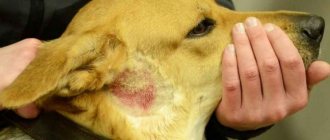The cold is a disease that most often develops in the autumn-winter period. Rain, bad weather, wet feet? You already feel overwhelmed, your nose is running, and your throat is starting to hurt. Many loving owners who have pets at home worry whether a dog can catch a cold from a person. This question is especially often asked by owners of puppies who have just undergone vaccination and have a rather weak immune system. Let's look into this issue.
Understanding the terminology
Dogs also get colds and flu. But owners should not blame themselves for the fact that their pet is forced to undergo treatment. Ask your veterinarian if your dog can catch colds from humans. He will clear your doubts. But let's talk about everything in order. There are two options for the development of events:
- The animal becomes infected with viruses, fungi or bacteria from a similar organism and becomes ill.
- A dog becomes hypothermic if it swims in cold water or lives in an old kennel in winter. The immune system weakens, and those bacteria that previously slept peacefully on the mucous membranes begin to attack. This is how the disease develops. Moreover, this process can be rapid.
Measures to prevent colds in dogs
Veterinarians constantly remind dog owners about preventing colds in their pets. If the dog is small and has little hair, its body should be insulated with blouses and overalls. You should not walk with such animals for a long time, and during the walk they should move more and not sit in the arms of the owner.
If the dog lives in a kennel, you need to insulate your pet’s room or try to find a place for the dog in the house.
The most effective way to prevent the disease is vaccination. Before the cold weather, it is best to undergo a preventive examination by a veterinarian to protect your pet from problems, get specific consultation and advice from a qualified physician. A routine blood test and a special vaccination will help the animal survive the winter safely.
Although many veterinarians will answer negatively when asked by an animal owner whether a dog can become infected with influenza or acute respiratory infections from a person, it is better to try to protect your pet from the possibility of infection.
If there is a family member with the flu in the house, you should not allow the dog to sleep in the same room with him.
You need to walk your pet in the fresh air as much as possible. Even if the weather outside is not very favorable, it is better to go out into the air, while slightly reducing the walking time.
If, nevertheless, the dog owner notices a general malaise and symptoms of a cold in his pet, it is necessary to consult a specialist as soon as possible. In the absence of examination and treatment, minor symptoms of the disease can develop into a serious illness.
Conclusion for dog owners: since scientists are not exactly sure that it is impossible for a dog to become infected from a person with the flu, you should not risk the health of your pet, because we are the ones responsible for it.
Man is a dog's friend
This is true. But does this have anything to do with the first case? Can a dog catch a cold from a person? If someone in the family gets sick, is it necessary to isolate the pet and take it to relatives? Veterinarians claim that influenza viruses and all other diseases that we call acute respiratory viral infections and acute respiratory infections cannot be transmitted from owner to pet.
At the same time, the canine influenza virus was discovered relatively recently. Its symptoms are very similar to the one you and I suffer from. That is why if a pet and someone in the family get sick at the same time, they mistakenly believe that they are affected by the same illness. To date, this topic has been well studied; when asked whether a dog can catch a cold from a person, experts answer in the negative.
Can a dog catch a cold from a person?
Apchhi! Are you sneezing? Do you have a stuffy nose or a sore throat? In humans, colds usually occur after contact with a person infected with a virus (doctors call this ARVI - acute respiratory viral infection). Other symptoms besides sneezing include a sore throat or stuffy nose, as well as watery eyes and excess mucus in the nose and throat.
So, can your dog catch a cold from you? Great news: if you're sick and your puppy wants to lick or hug you to cheer you up, don't shoo him away. As a rule, ARVI and many bacterial infections are species specific, i.e. They can only affect certain types of animals or only humans, which is why you don't have to worry about giving your pet a common cold. According to the PetMD portal (the largest international online information portal about pet health, the materials of which are approved by veterinary specialists), colds are not transmitted to animals from humans.
Can a dog catch a cold from another dog? Unfortunately, the answer to this question is “Yes.” Just because an animal can't get ARVI from people doesn't mean your puppy can't get it from another sneezing dog.
In general, many of the symptoms of infection that appear in your dog will be the same as in humans. So, according to PetMD, the types of viruses that affect people and dogs are different, but the symptoms are mostly the same: sneezing, coughing, runny or stuffy nose, and watery eyes.
There are many viruses that dogs can transmit to each other. Let's look at one of the most common types of "dog colds."
Kennel cough
Kennel cough is a group of quite dangerous respiratory diseases that are easily transmitted to other dogs, which a pet can “catch” in a place where other dogs gather, for example at dog shows or training classes. The bad news is that your dog doesn't even have to come into direct contact with an infected dog. Viruses can be found on a variety of common items, such as water bowls or toys that have saliva from a sick dog on them. According to Vetstreet, a veterinarian-approved, online information portal for better pet health care software for owners and veterinarians, a loud, frequent, dry cough that sounds like a goose is the most common sign of kennel cough. Infected dogs gag and gag, as if they have something in their throat and are trying to get rid of it. Dogs infected with kennel cough usually have symptoms that last four to ten days. Treatment, which can only be prescribed by a veterinarian after examining the animal, depends on the course and severity of the disease and may include both observation and improvement of living conditions, as well as the use of antibiotics and other medications.
Always together
When an owner falls ill, his loving pet does not want to leave him. The dog lies nearby, constantly licking his hands and face, which causes natural concern for his health. Yes, the opinion of veterinarians is unshakable, but suddenly the pet is special. Especially if after some time the dog begins to show symptoms of canine flu. This is usually:
- Heat.
- Cough.
- Sneezing.
- Lethargy.
- Decreased appetite.
Agree, this is very similar to how ARVI occurs in humans. And from that moment on, the owner has no doubt whether the dog can catch a cold or flu from a person. Of course, veterinarians are simply wrong. No, it's a coincidence. You and your pet have suffered from similar illnesses.
Similarities and differences between colds in dogs and people
Many owners worry about their pets when they are sick. Reasons for worry are not unfounded, because when people and dogs have a cold, the symptoms for everyone are almost identical:
- Weakness.
- Increased body temperature.
- Poor appetite.
- Rhinitis, sneezing, cough, sore throat.
- Relief for several hours a day.
Note! If you follow bed rest and support the body, the recovery period is 2–5 days.
However, the same cold can be caused by a variety of microorganisms. That's the difference between them. Pathogenic bacteria and viruses are species specific. This means that a particular microorganism may only affect dogs or only people. This means that interspecies infection is impossible.
The human cold is usually the result of an infection of the body by one of the strains of rhinovirus or coronavirus. Dog colds can be caused by combinations of pathogenic bacteria:
In addition, unvaccinated dogs can become infected with specific viral diseases, some of which have similar primary symptoms:
There is still an exception - bordetella, bacteria that can infect people and dogs, including at the same time. However, infection of people almost always passes without a trace and is asymptomatic.
Transmission routes
Indirectly, a person may be involved in the fact that his pet gets sick. It can serve as a carrier of canine influenza. In this case, the owner himself will only be a carrier. For example, you came to visit friends whose dog was sick. Even if there are no obvious symptoms yet, pathogens can spread through airborne droplets. They will get home safely with you and cause your pets to become ill.
In addition, the owner is responsible for the animal’s nutrition and living conditions. Therefore, when talking about whether a dog can get a cold from a person, one can answer positively, but if the owner does not fulfill his obligations. If a pet does not eat well and sleeps in a draft, then a person can become the culprit of his illness.
Signs, symptoms, risk group
An objective diagnosis is made by a veterinarian based on an examination. At home, you can diagnose a cold based on the most obvious signs. How can you tell if your pet is sick? Here are the most obvious symptoms of a cold in a dog:
- lethargy, reluctance to go for a walk;
- nose dry and hot;
- elevated temperature (more than 39 degrees) compared to normal;
- lack of appetite;
- runny nose, cough, sneezing;
- the fur became dull and matted.
If the pet is overtaken by illness, he will be lethargic and sleep a lot. Inflammation of the nasal mucosa, swelling and mucus production lead to a runny nose, uncomfortable coughing and sneezing. The nose becomes hot and dry, indicating an increase in body temperature compared to normal. The condition of the coat is deteriorating.
Important! If the dog coughs heavily, and colorless and odorless discharge flows from the eyes and nose, then it is quite possible that this is a manifestation of the pneumonic form of distemper.
If these symptoms are detected, you must immediately take your pet to a veterinarian. The consequences of an incorrect, self-made diagnosis can be very serious.
A common cold can develop into pneumonia due to a viral infection.
The list of risk factors includes the following:
- Genetic predisposition. Some breeds are more susceptible to colds. Most often, decorative, small breeds of dogs get colds.
- Age. Typically, young or elderly individuals are more vulnerable, which is associated with reduced immunity.
- Conditions of detention. Poor nutrition makes your furry friend more vulnerable to infection.
- Contact with a sick animal. Communication with stray relatives should be excluded. They are most likely sick.
- Parasites. Fleas and worms significantly weaken the immune system.
- Low activity. If a pet leads a sedentary lifestyle, then it becomes more susceptible to colds.
Can a dog catch a cold from a person? A viral infection that can infect the human body does not affect dogs. A virus is an “intelligent” parasite that attacks only organisms “suitable” for it.
Human strains of ARVI are not dangerous for dogs and cats.
However, it is still impossible to completely exclude the possibility of your pet becoming infected with new forms of influenza.
Before starting treatment for colds in dogs, you must contact your veterinarian to clarify your own diagnosis. How are colds treated? Initial measures include the following:
- reducing walks to 10-15 minutes;
- ensuring peace, the availability of warm drinks;
- eliminating drafts and dampness in the room, the temperature should be comfortable;
- the pet's place is covered with a fabric that retains heat, and babies will need a blanket;
- extra affection to calm a sick pet.
If the above measures do not help, then we strongly advise you not to experiment on your shaggy friend, but to take him to a veterinarian for examination. Further treatment at home should only be carried out under the supervision of a specialist.
The course of treatment usually includes therapy for cough, runny nose, and fever. It is quite possible that these will be antibiotics, expectorants, nasal drops, immunomodulators or antiviral serum.
Important! During drug treatment, it is necessary to closely monitor the pet's condition.
Latest Research
It is unlikely that a veterinarian will tell a frightened owner whose beloved pet is sick about this. But today scientists are beginning to doubt that viruses are not able to adapt to new conditions and organisms. Of course, this doesn't happen overnight. They can't mutate that quickly. But theoretically, the human virus can easily adapt to life in the body of a dog, with which a person has lived under the same roof for so long.
But to date there are no proven experiments. Therefore, no veterinarian can confirm whether a dog can get the flu from a person. Perhaps, over time, a new strain will mutate, which will freely pass from pet to owner and vice versa.
Causes
We have already covered some of them. But there are a number of other factors that contribute to pet illness:
- Home lifestyle. The dog goes out in the morning and evening for five minutes to satisfy its natural needs. In this case, the animal's immune barrier is reduced. Even if the weather is bad, the walk is shortened, but not cancelled.
- Hypothermia. In cold weather, dress your dog, do not allow him to eat snow and ice, and do not bathe him in winter. If the dog lives outside, then insulate the box for the winter.
- Nutrition. An unbalanced diet, especially in cold weather, leaves the body defenseless against infection.
Of course, the animal must receive preventive vaccinations.
Diagnostics
This raises another important question. Each owner has his own opinion about whether a dog can become infected with ARVI from a person. And if he is convinced that he can, he usually does not pay attention to the symptoms of the disease. It is believed that this is a mild ailment and will go away on its own. In fact, consultation with a specialist is necessary; complications may develop.
The doctor must listen to the internal organs, take a blood test, smear and urine test. Based on these data, examination and history taking, he will be able to prescribe effective treatment. Don't forget that nasal discharge, cough or fever are not always symptoms of a flu or cold. Therefore, a doctor must make a diagnosis.
What are the types of colds and viral diseases in dogs?
Like people, dogs are susceptible to the negative influence of viruses and bacteria; they also become hypothermic, and with weak immunity, they sneeze, cough and suffer from a runny nose. Unfortunately, pets are not always able to inform the owner about their health status, and a person may not recognize the symptoms of the disease in time, which is fraught with serious consequences for the sick dog.
- problems with the respiratory system;
- loss of appetite;
- temperature rise above 38°C;
- profuse nasal discharge, coughing, sneezing;
- the dog experiences increased thirst;
- behavioral changes in the dog: weakness, the animal sleeps a lot, it is passive and refuses its favorite games;
- Sometimes the animal's cervical or inguinal lymph nodes become enlarged.
Studies have confirmed only a few cases of dogs becoming infected with the influenza virus from humans; the percentage is insignificant. However, even this number can cause concern and caution during a human illness, because veterinarians reasonably assume that there are actually many more cases of infection.
Treatment
Only after diagnosis can a specialist prescribe the drug required for each specific drug. This is most often an antibiotic. In this group, Vilprafen, Dorin, and Amoxiclav are prescribed. They are usually sold in a special pharmacy at a veterinary clinic. From the first day of illness, it is advisable to give antiviral drugs: Vitafel-S, Cycloferon. For better expectoration, expectorants are prescribed. This can be licorice root, plantain decoction, coltsfoot decoction. At high temperatures, Analgin with Diphenhydramine is prescribed. But not Paracetamol, it is contraindicated for dogs.











